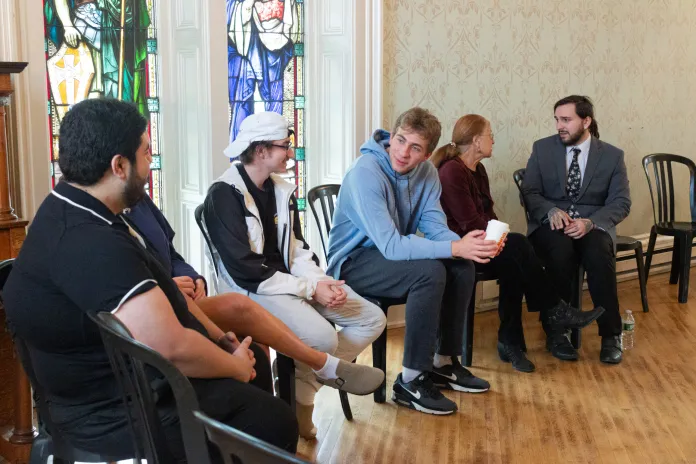
The SUNY Plattsburgh Interfraternity Council and Inter-Sorority Association have been working to improve the quality of life of residents in the Center City area where many residential homes are located. On the morning of Saturday, May 3, a group of fraternity and sorority leaders and community residents met to discuss the issues causes by students that often affect full-time city residents. From that conversation, several topics for further action were identified for the governance councils and chapters to begin to address during the fall semester.
College towns are rife with parties and mayhem as young adults balance newfound freedom with the pursuit of higher education, causing rifts with neighbors who have long settled down.
Student Fraternity & Sorority Life representatives, mayoral candidate Iris Cain and city residents exchanged feedback to improve off-campus student conduct and strengthen community relationships.
About 20 people gathered at the Hartwell House located at 77 Brinkerhoff St. on Saturday, May 4. Cain and Inter-Sorority Association President Sophia Sabatini moderated the discussion.
“I think that this is the start of bridging that gap,” Sabatini said. “I know that, in our community, we all have a dedication to service — how much more impactful would that service be if we knew the people we were serving?”
Long-time Plattsburgh residents and Behavioral Health Services North professionals joined students in discussion, agreeing that college students are generally a wanted presence in the city but could be more mindful of their volume, safety and party guests.
‘ONE OF OUR TREASURES’
Students engaged in Greek life organizations embody leadership on and off the SUNY Plattsburgh campus, said Allison Swick-Duttine, director of Fraternity & Sorority Life.
Over more than 25 years of work, she has seen Greek life organizations contribute to cultural shifts on campus, Swick-Duttine said. As such, the student leaders can model behavior for other students and work toward bridging the gap between the campus and the surrounding community, even if they’re not the only students contributing to the issue.
Residents said they wanted to keep the tone of the meeting light and friendly, noting the value that students add to the city.
“I don’t really have horror stories about the university taking away the joy of living in a small town,” Bodrogi said.
A university — and its students — add to the atmosphere of a small town, Bodrogi said. They provide exposure to new ideas and connect the community through service.
“The student population is one of our treasures,” Bodrogi said.



















